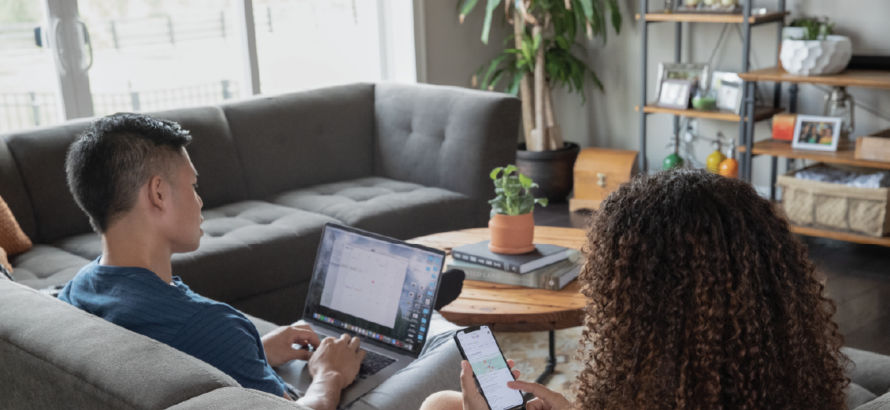
Any sudden, unplanned decision to purchase a product or service is considered to be impulse buying. These spur-of-the-moment purchases can be big or small, but they are never planned. If you’re standing in line at the supermarket checkout and suddenly decide to purchase a candy bar, that’s an impulse purchase. But the same can be true of a new sweater, a pair of shoes or even a new car – if it wasn’t something you needed and you didn’t intend to make the purchase.
If you want to stop impulse buying once and for all, these tips are designed to curb your impulsive spending tendencies:
1. Plan your purchases
Headed to the supermarket? Don’t leave home without a list. Then make it a habit to stick to the list. A list helps ensure that your purchases are more deliberate and not impulsive, making it easier to scurry on past those tempting new dessert samples that you don’t need and never intended to purchase in the first place. For larger purchases, plan ahead, save and shop around.[1]
2. Avoid going to the mall
Out of sight, out of mind. That should be your mantra when it comes to trips to the mall or any shopping opportunity for that matter. Simply avoid the temptation and stop spending money unnecessarily by only visiting a store when you have a specific purchase in mind. If shopping is your form of entertainment, find other ways to enjoy yourself.[1]
3. Avoid buying on social media
You’re scrolling through social media when suddenly a great-looking pair of shoes appears in your feed. And they’re on sale! You’re only a couple clicks away from owning those shoes, except that you don’t need a new pair of shoes and you never intended to buy them. To avoid this temptation in the future, you may want to un-follow any accounts that encourage or simply avoid social media altogether.
Keep in mind that social media also leads to comparisons.[2] When you see someone else showing off their new car or dream vacation, it’s tempting to think you need those things, too. The truth is, keeping up with the Joneses is a game you can’t win. It almost always leads to impulse shopping, which isn’t good for your budget.
4. Make sure you’re ready to make a big purchase
Larger purchases deserve some additional planning and evaluation to determine if they’re necessary and to make sure you’re financially prepared. Shop around, read some product reviews, and above all, find out when you can save your money to ensure your budget doesn’t take a financial hit. After some planning, you may decide the purchase isn’t necessary after all.
5. Reevaluate what you already have
Have you ever purchased an item only to discover that you already own something similar? It’s easy to do, especially if you’re not well organized and don’t know what you already have. Is the item worn out? Do you need two of the same thing? Maybe you do. But you probably don’t. If you’re not sure how to stop buying stuff, begin by organizing your belongings. This will help you reevaluate what you already have and prevent you from spending money unnecessarily.
6. Unsubscribe from emails from retail stores
Nearly every time you purchase something from a retailer, you’ll be asked to subscribe to their emails or newsletter. That’s because they know that putting their merchandise in front of you increases the potential for impulse shopping. This is especially true when there’s a sale involved. Start by unsubscribing to retail emails and newsletters. In addition to un-cluttering your inbox, you’ll avoid the urge to splurge on something you don’t need.[2]
7. Read product reviews
How much time do you spend reading product reviews before you buy? If the answer is little to no time at all, perhaps you should give them a try. Product reviews can be a useful source of information for determining if the product is worth parting with your hard-earned dollars. You may come across information that alters your view of the product. Maybe it’s not the quality you need or it doesn’t perform as well as you expected. A little research goes a long way, and firsthand knowledge from other shoppers is one of the best ways to uncover the lesser known facts before you buy.
8. Use credit cards responsibly
Unlike buying with cash, purchasing with a credit card can give you a false sense of how much money you’re actually spending. Even smaller purchases can add up, and before long you’ve got a big credit card bill that really disrupts your budget. Then you need to come up with enough cash to pay for it. Whenever possible, use cash or a debit card for all your purchases.[3] And if you own a credit card, follow these tips on how to use a credit card.
9. Wait before you buy
Most people succumb to impulse buying because it makes them feel good. In the moment, it feels like you can’t live without the item. It’s also easy to believe that buying it will make your life incredibly better. But if you give yourself a chance to calm down, you may view it with a newer, fresher perspective. Retailers tempt shoppers with sales that confer a sense of urgency, such as deals that are only good for 24 hours. Instead, commit to always waiting a day or even longer before making a purchase. You may feel different about it in 24 hours or so.[2]
10. Avoid emotional shopping
Emotions play a big role in our purchasing habits. On a good day, it’s tempting to buy something because you’re feeling on top of the world. Likewise, a bad day could lead to purchasing an item because you think it will improve your mood, or simply because you feel like you deserve it. Planned purchases help you overcome these emotional responses and avoid buyer’s remorse.[2]
11. Focus on your goals
If you have bigger, long-term financial goals –and you should – impulse buying can sidetrack your plans in a hurry. Think of it like this: Every purchase you make takes you further away from reaching your goals, whether it’s paying off college debt or buying a new car. Keeping your eye on the prize goes a long way when you want to avoid impulse spending.[2]
It might also help to think of every purchase in terms of your hourly wage. Whenever you want to purchase something on impulse, think about how many hours you have to work to make that item yours.[1] Remember, focusing on your financial goals begins with learning how to manage your money.
12. Make a budget and stick to it
Still not sure how to stop overspending? If you really want to curb your impulsive buying habits, a budget can be your greatest ally. But while a budget determines where your money should go each month, it’s still up to you to stick to it. Simply put, if something is not part of your budget, then you shouldn’t spend the money.[3] Think of it as a roadmap for your financial success.
The next time you’re tempted to buy something on impulse, consider putting some or all of these strategies into action. Start now by learning how to stick to your monthly budget.
[1]“10 Simple Ways to Beat Impulse Buying,” (April 8, 2020).
[2]“Impulse Buying: Why We Do It and How to Stop,” (Sept. 24, 2020).
[3]“How to Stop Overspending: Tips from 9 Experts,” (August 5, 2020).



